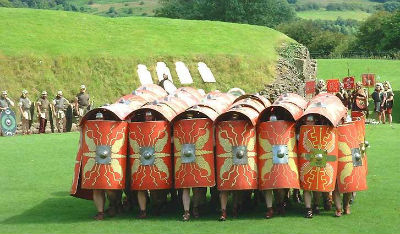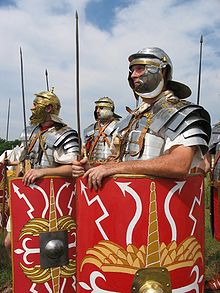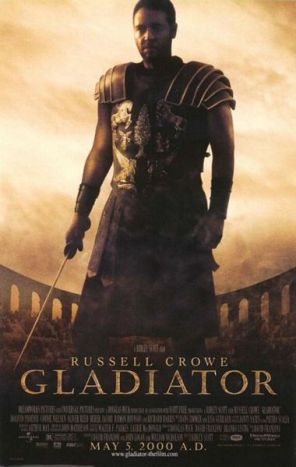 Mamertine Prison in Rome – a strong legend has it that both Peter and Paul
were imprisoned here before execution.
Mamertine Prison in Rome – a strong legend has it that both Peter and Paul
were imprisoned here before execution.By Neil Earle
I was asking the church this weekend if they thought that Halloween – kids dressed in orange and black, zombies on parade, new horror movies (Friday the Thirteenth, Part XXV) – if this was Satan’s best shot.
Most thought no.
I then played a clip of a Hitler Nuremberg Rally in 1936 to show far more deadly effects of a wicked spirit that caters to people’s feelings of wounded pride, resentment and bitterness and blame-placing following Germany’s defeat in war and a basically unjust peace imposed by force.
 Mamertine Prison in Rome – a strong legend has it that both Peter and Paul
were imprisoned here before execution.
Mamertine Prison in Rome – a strong legend has it that both Peter and Paul
were imprisoned here before execution.We agreed that the Prince of the Power of the Air (Ephesians 2:1-4) can do much more dangerous things than overturn an outhouse or smear a garage on October 31 (without justifying the criminality that sometimes gets unleashed at this season).
The question then arises: What can Christians do to gain the victory over these dark forces that at least Halloween forces us to contemplate each year. Some 1900 years ago, the biblical writer Paul was under house arrest in the city of Rome. Paul, chained by the wrist to a Roman soldier, was a resourceful and skilful communicator. He was not averse to drawing spiritual lessons even from his prison experience. Paul knew that Rome’s relentless legions and the hardiness, discipline and steadiness of the individual Roman solider were already legendary.
Paul also knew that authentic Christianity was also a life and death struggle for eternal stakes. And so, sitting down to write to his beloved congregation in Ephesus in far-off Asia Minor, Paul tried to motivate his fellow-Christians with one of his most striking word-pictures. “Put on the full armour of God, “ Paul wrote to his converts, “so that you can take your stand against the devil’s schemes” (Ephesians 6:11).
 Roman Tortise or Testudo – the ancient armored division.
Roman Tortise or Testudo – the ancient armored division.Paul knew that Christians had enemies – both seen and unseen. He encouraged the Ephesians to stand on full alert: “For our struggles are not against flesh and blood, but against the powers of this dark world and against the spiritual force of evil in the heavenly realms” (Ephesians 6:12). Satan the Devil is represented in the Bible not as a cartoon-like figure with horns and a pitchfork but as a cunning manipulator of unhealthy attitudes, negative moods and bitter emotions (Acts 5:1-11). When human beings allow themselves to give in to Satan and his spiritual machinations much evil can be wreaked in a family, a group a church or a nation.

But there is hope. “The Roman soldier has his armour,” Paul was saying, “so does the Christian.” He reemphasized the point: “Therefore put on the full armour of God, so that when the day of evil comes, you may be able to stand your ground, and after you have done everything, to stand” (Ephesians 6:13).
More often than not, Satan’s evil influence comes at us through the culture. In a society where police departments now routinely consult psychics, where newspaper horoscopes are followed avidly, where so much entertainment seems to have a blatantly devilish feel to it, we should know what Paul meant by “the powers of this dark world.”
Often Christians succumb to moods of negativism, bitterness and depression. Or we are subtly influenced through negative experiences with people. But there is good news – the armour of God can protect us.
“Stand firm then,” Paul urged the Ephesians, “with the belt of truth buckled around your waist.” From the belt around the waist hung the Roman soldier’s two-edged sword or gladius (from which comes the word gladiator). The belt helped guard the vitals but also put the gladius within quick and easy reach. Later in this letter, in verse 17, Paul compares the Roman sword to the word of God, the Bible. The Bible says “your word is truth” (John 17:17).
 Roman military prowess still impacts popular culture.
Roman military prowess still impacts popular culture.The Roman gladius was carried on the right thigh. The blade was strong and firm and permitted a powerful thrust and a mighty cut with either edge (Polybius, History VI. 23). Similarly, the Bible is the Christian’s offensive weapon. It cuts through the spiritual snares and entanglements that threaten to overwhelm us, to make us lose sight of our goal. The Bible message, correctly understood, is healthy and holistic. It reminds us that human history is going somewhere and that our lives fit into a continuous moving drama of which God is the Author and Finisher (Ephesians 1:9-10).
We are not out here alone exposed on a battle front without allies. This sure knowledge is comforting and reassuring for Christian soldiers. It guards against the depression and hopelessness that can leech out our best efforts to resist sin, our enemy.
“…with the breastplate of righteousness in place” (Ephesians 6:14).
The Roman soldier wore a leather breastplate strengthened with metal strips. It was difficult for a sword or a flaming arrow to pierce. So it is with the Christian soldier. Though still a sinner, the Christian knows his righteousness is a gift, given to him by God Himself, through Christ (Philippians 3:9). By ourselves we could never live the Christian life or even attempt to walk worthy of the Lord.
But Jesus Christ is our righteousness. He is also our Commander-in-Chief. Because Christ lives inside us the darts of guilt and negativism do not penetrate our spiritual armour (Galatians 2:20). Paul wrote elsewhere about Christ living inside the Christian as our sure defense, our guarantee of true righteousness, true holiness (1 Corinthians 1:30).
Solid footing in difficult terrain or for hurrying through fiery obstacles often gave Roman soldiers the winning edge as they chased enemies along siege towers or ramparts that were aflame. Proper footwear makes it possible to stand and fight! Three times Paul encouraged Christian soldiers to stand “having shod your feet with the preparation of the gospel of peace “ (Ephesians 6:15).
The hardy hob-nailed Roman sandals were a key to victory. The swiftness and mobility of Roman attack forces along the superb road nets was often the decisive factor in battles. As a general Julius Caesar’s personal watchword was celeritas – swiftness! On a forced march, Caesar could get his battle-hardened Tenth Legion to cover 25-30 miles in a matter of hours. “A moving target is hard to hit” is a long-standing military maxim.
Similarly, Christians who are active in spreading the gospel of peace in whatever ways are available make them hard for Satan to target. They are “on the move” spiritually.
But the infantryman’s real ace in the hole was the sturdiness and durability of the Roman shield or scutum. As the Roman historian Polybius recorded, “the width of its convex surface is 2 ½ feet, the length 4 feet, and the thickness at the rim is 3 inches. It is made of a double thickness of planks joined together with glue; the outer surface is wrapped first with canvas, then with calfskin.
“Along the rim, at the top and bottom, it has an ornamental binding made of iron, which protects it from the cutting strokes of swords. It also has fitted to it an iron boss, which deflects the more destructive blows of stones, long pikes and heavy missiles” (The Histories, Book VI).
When all else failed a soldier could hide behind his shield and “ride out” a hail of stones, arrows, flaming pitch or projectiles. But amazing stories survive of the massed strength of the Roman shields. Take “the tortise” for example. Massed units would align their shields over their heads while the outer line of troops held their shields in front of them forming an almost impenetrable square. A crack unit could form a tortise so securely that a horse and chariot could ride on top, vital in surviving a storm of arrows and spears and stones.
Something like this was at the back of St. Paul’s mind when he counseled his people: “In addition to all this, take up the shield of faith, with which you can extinguish all the flaming arrows of the evil one” (Ephesians 6:16).
The “flaming arrows” were darts tipped with tow, dipped in pitch and set alight, forming deadly long-range missiles. But an arrow sinking into the leather boss of the scutum burnt itself out. Similarly, Christian soldiers need the shield of faith, the unshakeable conviction that God exists, that Christ is alive and that nothing can overthrow His plans and purposes (Matthew 16:18).
The “flaming arrows” in the Christian life can be evil reports, slanderous attacks, sly innuendoes, bitter faith-destroying attacks on the integrity of those with whom we are supposed to be fellow-soldiers. Sometimes new recruits to the faith find out that the cruelest attacks come from those closest to them. Jesus warned that some of our foes would come from within our own household (Matthew 10:36).
But the shield of faith, the deep-rooted conviction that God is working out a better purpose in our lives – this extinguishes Satan’s deadly darts every time.
Even today, in potentially violent sports such as football, car racing or ice hockey, a helmet is virtually mandatory. The helmet of salvation relates to what Paul elsewhere describes as the “hope of salvation” (1 Thessalonians 5:8). The helmet protects the head and guards the brain. It guards against “shell-shock” in the Christian life. We do that by training our mind to seek the things of God, heavenly things (Colossians 3:2).
The source of high Christian morale is training our minds with God's help to stay focused on God and his goodness, his abundant mercy, his loving favor towards us, to adopt “an attitude of gratitude.” This is part of what it means for the Christian soldier to “take captive every thought to make it obedience to Christ” (2 Corinthians 10:5).
Sometimes the spiritual battle is intense indeed. Just before Paul’s time, during the Roman civil wars, the magnificence of Roman morale, training and equipment shone through. The historian Suetonius mentioned that a single company of the Sixth Legion held a redoubt against four legions for several hours even though almost every man was wounded by arrow-shot. 130,000 arrows were collected there afterwards. The centurion Cassius Scaeva, blinded in one eye, wounded in the thigh and shoulder continued to defend the approaches with 120 holes in his shield. At the naval battle of Massilia, a private soldier grasped the stern of an enemy ship, boarded her and drove the enemy back with the boss of his shield only (The Twelve Caesars, page 43).
As Christian soldiers we too have been promised battle. We have also been promised victory (1 Corinthians 15:57). Neither the shock of battle nor the sly and off-putting attacks of the Devil (whose name mean “Slanderer”) can cut us down. We fight the good fight. We learn we can surely stand through all the shocks and alarms of the Christian life once we arm ourselves with the armour of God.